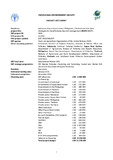| dc.description | This project – Strategies for trawl fisheries bycatch management (REBYC-II CTI) – will contribute to the more sustainable use of fisheries resources and healthier marine ecosystems in the Coral Triangle and Southeast Asia waters by reducing bycatch, discards and fishing impact by trawl fisheries. It will be executed by the Southeast Asian Fisheries Development Center (SEAFDEC), based in Bangkok, Thailand, and the governments in the participating countries Indonesia, Papua New Guinea, Philippines, Thailand and Viet Nam in partnership with the private sector and relevant national, regional and international organisations. The Food and Agriculture Organization of the United Nations (FAO) is the Global Environment Facility (GEF) agency for the project that will be funded jointly by GEF and the implementing and executing partners. The project is for four years with a starting date in 2011 and a total budget of USD 11,218,600.
The Coral Triangle region of Southeast Asia is one of the world’s most biologically diverse, economically productive and potentially vulnerable marine zones. As a result of increasing populations and exploitation pressures, growing threats from pollution and major ecosystem change are a particular concern in the region. Also – as more widely in the global context – the untargeted capture of fish and non-fish species, commonly called bycatch and discards, is an increasing concern. Bycatch includes fish, turtles, marine mammals, and corals and other seabed fauna and flora. This part of the catch tends to be poorly monitored and not managed but could have an important impact on fishery resources, habitats and ecosystems. In some fisheries and regions, there is an increasing trend towards retention of the bycatch consisting of juveniles and small-sized fish for use as food for human consumption or for utilization as aquafeed. This is therefore a complex issue, requiring resource and biodiversity aspects to be tackled alongside human needs and involving a mix of policy, technical and community support measures.
Based on the principles of the FAO Code of Conduct for Responsible Fisheries (1995) and the Ecosystem Approach to Fisheries (EAF), the project will build on the successes of the 2002-2008 FAO/UNEP1/GEF global project “Reduction of Environmental Impact from Tropical Shrimp Trawling through the Introduction of Bycatch Reduction Technologies and Change of Management”. It intends to focus on multispecies bottom trawling, where bycatch issues are amongst the most serious, with potentially significant effects on ecosystems and livelihoods. The project aims to address these challenges by promoting sustainable fishing practices and improved trawl management. The project will implement activities and produce tangible results in project areas in the participating countries at the same time as working at the national and regional levels to improve policy and strategic frameworks and create best practices. The project will also promote the implementation of the “International Guidelines on Bycatch Management and Reduction of Discards”, currently under development by FAO, and its results will inform related global initiatives on responsible fishing. This will contribute to a more sustainable use of existing fishery resources, protection of marine habitats and ecosystems, and more secure livelihoods.
Accordingly, the Global Environment Objective of the project is to achieve Responsible trawl fisheries that result in sustainable fisheries resources and healthy marine ecosystems in the Coral Triangle and Southeast Asian waters by reduced bycatch, discards and fishing impact on biodiversity and the environment. The project Development Objective is Effective public and private sector partnership for improved trawl and bycatch management and practices that support fishery dependent incomes and sustainable livelihoods. | en |

